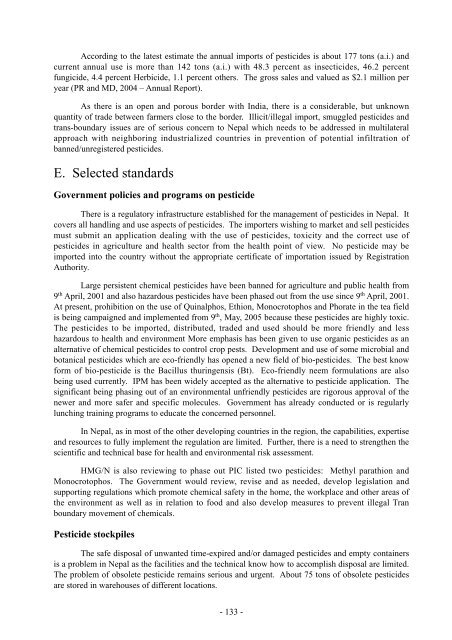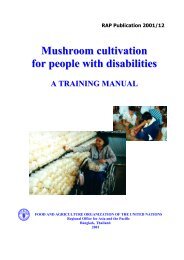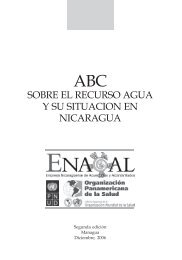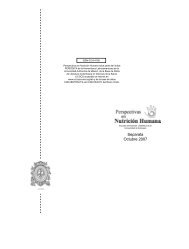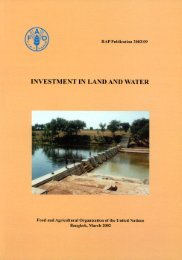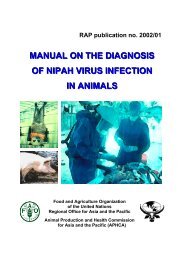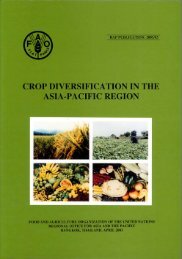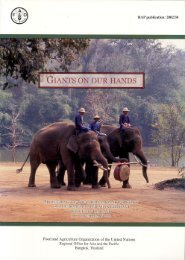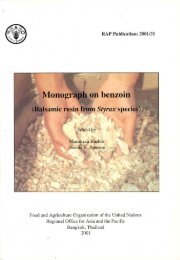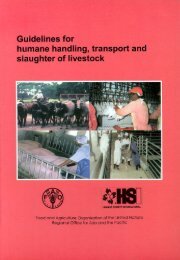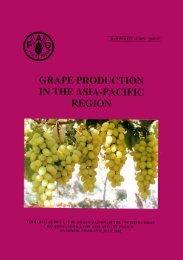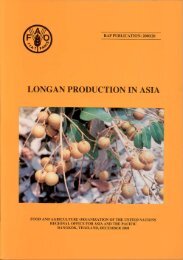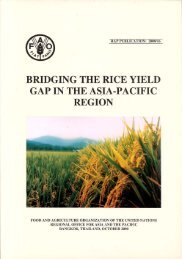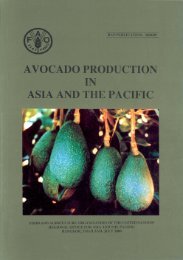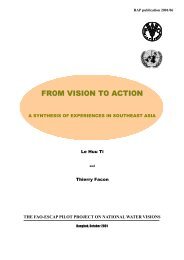Proceedings of the Asia regional workshop on the
Proceedings of the Asia regional workshop on the
Proceedings of the Asia regional workshop on the
Create successful ePaper yourself
Turn your PDF publications into a flip-book with our unique Google optimized e-Paper software.
According to <str<strong>on</strong>g>the</str<strong>on</strong>g> latest estimate <str<strong>on</strong>g>the</str<strong>on</strong>g> annual imports <str<strong>on</strong>g>of</str<strong>on</strong>g> pesticides is about 177 t<strong>on</strong>s (a.i.) and<br />
current annual use is more than 142 t<strong>on</strong>s (a.i.) with 48.3 percent as insecticides, 46.2 percent<br />
fungicide, 4.4 percent Herbicide, 1.1 percent o<str<strong>on</strong>g>the</str<strong>on</strong>g>rs. The gross sales and valued as $2.1 milli<strong>on</strong> per<br />
year (PR and MD, 2004 – Annual Report).<br />
As <str<strong>on</strong>g>the</str<strong>on</strong>g>re is an open and porous border with India, <str<strong>on</strong>g>the</str<strong>on</strong>g>re is a c<strong>on</strong>siderable, but unknown<br />
quantity <str<strong>on</strong>g>of</str<strong>on</strong>g> trade between farmers close to <str<strong>on</strong>g>the</str<strong>on</strong>g> border. Illicit/illegal import, smuggled pesticides and<br />
trans-boundary issues are <str<strong>on</strong>g>of</str<strong>on</strong>g> serious c<strong>on</strong>cern to Nepal which needs to be addressed in multilateral<br />
approach with neighboring industrialized countries in preventi<strong>on</strong> <str<strong>on</strong>g>of</str<strong>on</strong>g> potential infiltrati<strong>on</strong> <str<strong>on</strong>g>of</str<strong>on</strong>g><br />
banned/unregistered pesticides.<br />
E. Selected standards<br />
Government policies and programs <strong>on</strong> pesticide<br />
There is a regulatory infrastructure established for <str<strong>on</strong>g>the</str<strong>on</strong>g> management <str<strong>on</strong>g>of</str<strong>on</strong>g> pesticides in Nepal. It<br />
covers all handling and use aspects <str<strong>on</strong>g>of</str<strong>on</strong>g> pesticides. The importers wishing to market and sell pesticides<br />
must submit an applicati<strong>on</strong> dealing with <str<strong>on</strong>g>the</str<strong>on</strong>g> use <str<strong>on</strong>g>of</str<strong>on</strong>g> pesticides, toxicity and <str<strong>on</strong>g>the</str<strong>on</strong>g> correct use <str<strong>on</strong>g>of</str<strong>on</strong>g><br />
pesticides in agriculture and health sector from <str<strong>on</strong>g>the</str<strong>on</strong>g> health point <str<strong>on</strong>g>of</str<strong>on</strong>g> view. No pesticide may be<br />
imported into <str<strong>on</strong>g>the</str<strong>on</strong>g> country without <str<strong>on</strong>g>the</str<strong>on</strong>g> appropriate certificate <str<strong>on</strong>g>of</str<strong>on</strong>g> importati<strong>on</strong> issued by Registrati<strong>on</strong><br />
Authority.<br />
Large persistent chemical pesticides have been banned for agriculture and public health from<br />
9 th April, 2001 and also hazardous pesticides have been phased out from <str<strong>on</strong>g>the</str<strong>on</strong>g> use since 9 th April, 2001.<br />
At present, prohibiti<strong>on</strong> <strong>on</strong> <str<strong>on</strong>g>the</str<strong>on</strong>g> use <str<strong>on</strong>g>of</str<strong>on</strong>g> Quinalphos, Ethi<strong>on</strong>, M<strong>on</strong>ocrotophos and Phorate in <str<strong>on</strong>g>the</str<strong>on</strong>g> tea field<br />
is being campaigned and implemented from 9 th , May, 2005 because <str<strong>on</strong>g>the</str<strong>on</strong>g>se pesticides are highly toxic.<br />
The pesticides to be imported, distributed, traded and used should be more friendly and less<br />
hazardous to health and envir<strong>on</strong>ment More emphasis has been given to use organic pesticides as an<br />
alternative <str<strong>on</strong>g>of</str<strong>on</strong>g> chemical pesticides to c<strong>on</strong>trol crop pests. Development and use <str<strong>on</strong>g>of</str<strong>on</strong>g> some microbial and<br />
botanical pesticides which are eco-friendly has opened a new field <str<strong>on</strong>g>of</str<strong>on</strong>g> bio-pesticides. The best know<br />
form <str<strong>on</strong>g>of</str<strong>on</strong>g> bio-pesticide is <str<strong>on</strong>g>the</str<strong>on</strong>g> Bacillus thuringensis (Bt). Eco-friendly neem formulati<strong>on</strong>s are also<br />
being used currently. IPM has been widely accepted as <str<strong>on</strong>g>the</str<strong>on</strong>g> alternative to pesticide applicati<strong>on</strong>. The<br />
significant being phasing out <str<strong>on</strong>g>of</str<strong>on</strong>g> an envir<strong>on</strong>mental unfriendly pesticides are rigorous approval <str<strong>on</strong>g>of</str<strong>on</strong>g> <str<strong>on</strong>g>the</str<strong>on</strong>g><br />
newer and more safer and specific molecules. Government has already c<strong>on</strong>ducted or is regularly<br />
lunching training programs to educate <str<strong>on</strong>g>the</str<strong>on</strong>g> c<strong>on</strong>cerned pers<strong>on</strong>nel.<br />
In Nepal, as in most <str<strong>on</strong>g>of</str<strong>on</strong>g> <str<strong>on</strong>g>the</str<strong>on</strong>g> o<str<strong>on</strong>g>the</str<strong>on</strong>g>r developing countries in <str<strong>on</strong>g>the</str<strong>on</strong>g> regi<strong>on</strong>, <str<strong>on</strong>g>the</str<strong>on</strong>g> capabilities, expertise<br />
and resources to fully implement <str<strong>on</strong>g>the</str<strong>on</strong>g> regulati<strong>on</strong> are limited. Fur<str<strong>on</strong>g>the</str<strong>on</strong>g>r, <str<strong>on</strong>g>the</str<strong>on</strong>g>re is a need to streng<str<strong>on</strong>g>the</str<strong>on</strong>g>n <str<strong>on</strong>g>the</str<strong>on</strong>g><br />
scientific and technical base for health and envir<strong>on</strong>mental risk assessment.<br />
HMG/N is also reviewing to phase out PIC listed two pesticides: Methyl parathi<strong>on</strong> and<br />
M<strong>on</strong>ocrotophos. The Government would review, revise and as needed, develop legislati<strong>on</strong> and<br />
supporting regulati<strong>on</strong>s which promote chemical safety in <str<strong>on</strong>g>the</str<strong>on</strong>g> home, <str<strong>on</strong>g>the</str<strong>on</strong>g> workplace and o<str<strong>on</strong>g>the</str<strong>on</strong>g>r areas <str<strong>on</strong>g>of</str<strong>on</strong>g><br />
<str<strong>on</strong>g>the</str<strong>on</strong>g> envir<strong>on</strong>ment as well as in relati<strong>on</strong> to food and also develop measures to prevent illegal Tran<br />
boundary movement <str<strong>on</strong>g>of</str<strong>on</strong>g> chemicals.<br />
Pesticide stockpiles<br />
The safe disposal <str<strong>on</strong>g>of</str<strong>on</strong>g> unwanted time-expired and/or damaged pesticides and empty c<strong>on</strong>tainers<br />
is a problem in Nepal as <str<strong>on</strong>g>the</str<strong>on</strong>g> facilities and <str<strong>on</strong>g>the</str<strong>on</strong>g> technical know how to accomplish disposal are limited.<br />
The problem <str<strong>on</strong>g>of</str<strong>on</strong>g> obsolete pesticide remains serious and urgent. About 75 t<strong>on</strong>s <str<strong>on</strong>g>of</str<strong>on</strong>g> obsolete pesticides<br />
are stored in warehouses <str<strong>on</strong>g>of</str<strong>on</strong>g> different locati<strong>on</strong>s.<br />
- 133 -


